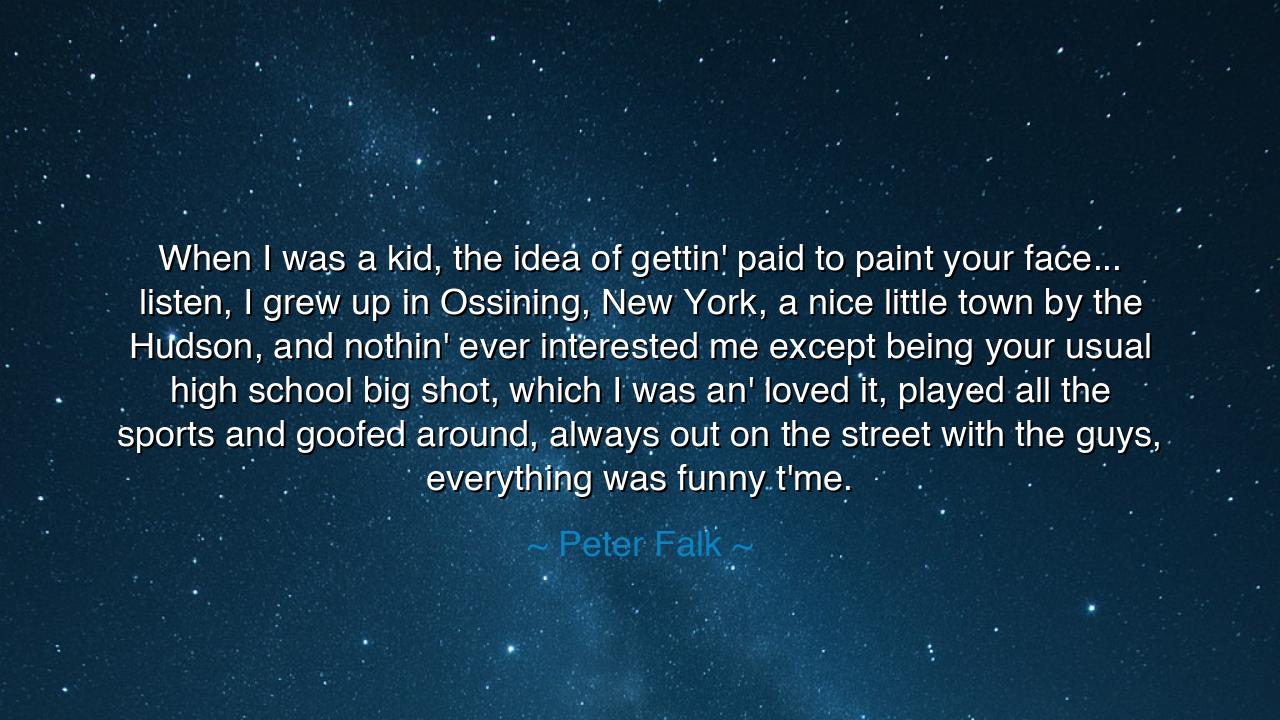
When I was a kid, the idea of gettin' paid to paint your face...
When I was a kid, the idea of gettin' paid to paint your face... listen, I grew up in Ossining, New York, a nice little town by the Hudson, and nothin' ever interested me except being your usual high school big shot, which I was an' loved it, played all the sports and goofed around, always out on the street with the guys, everything was funny t'me.






In the words of Peter Falk, “When I was a kid, the idea of gettin’ paid to paint your face... listen, I grew up in Ossining, New York, a nice little town by the Hudson, and nothin’ ever interested me except being your usual high school big shot, which I was an’ loved it, played all the sports and goofed around, always out on the street with the guys, everything was funny t’me.” — there breathes the warm, unguarded honesty of a man who never forgot where he came from. His words are not those of an actor looking back with pride, but of a soul remembering its roots, reminding us that greatness is often born not from ambition, but from joy.
The meaning of this quote lies in its humility — in the wonder of a man who found his destiny by accident, not design. Falk’s astonishment at being “paid to paint your face” reveals the innocence of one who never imagined art could be a livelihood. To him, acting was play, and play was life itself. In his youth, the streets were his stage, his friends his audience, his laughter his script. He teaches us that the foundation of creativity is not found in striving for fame or mastery, but in the childlike delight of simply doing what makes the heart come alive.
In ancient times, the philosophers of Greece spoke of the daimon — the inner spirit that guides each person’s true calling. It does not shout or command; it whispers through our pleasures, through the moments when we forget ourselves and feel most alive. When Peter Falk says that “everything was funny to me,” he is describing that sacred state of joyful awareness, where one lives in rhythm with life’s simple music. From that state arises all true art. The boy who laughed in Ossining became the man who brought laughter and depth to millions — not by abandoning his youth, but by preserving its flame.
Consider the tale of Mark Twain, born Samuel Clemens, who also grew up in a small town by a great river — the Mississippi. Like Falk by the Hudson, Twain spent his youth goofing around, dreaming not of greatness but of adventure. Yet it was from those very streets, those riverbanks, those boyhood escapades that the voice of Tom Sawyer and Huckleberry Finn was born. The world would one day revere him as a literary master, but his power came from the same source Falk describes: the laughter, mischief, and wonder of being young and fully present in life.
The origin of Falk’s sentiment is the recognition that artistry begins long before the stage or the screen — it begins in the spirit of play. As children, we are all artists, painting our faces with mud, pretending to be heroes, seeing humor in everything. The tragedy of adulthood is that we forget this sacred game. Yet the wise, like Falk, rediscover it. The actor, after all, is the one who refuses to let that playful soul die. To “get paid to paint your face” is simply to be rewarded for doing what the child within always loved: to imagine, to create, to laugh at life.
And so, the lesson we must draw from these words is clear: do not rush to become serious before your time. Life’s greatest treasures are hidden in moments of lightness. The world will tell you to grow up, to stop “goofing around,” but the ancients would tell you the opposite — to guard your playfulness as a temple of the divine. For it is there, in that space of laughter and curiosity, that genius takes root. What begins as foolishness may one day bloom into greatness, as long as it is done with sincerity of heart.
Therefore, remember the teaching of Peter Falk of Ossining: stay close to the streets that raised you, to the laughter that shaped you, to the humor that taught you how to see. Even when success comes, never forget the simplicity of joy. Let your work, whatever it may be, spring from the same spirit that once made you laugh beneath the open sky. For a life lived in seriousness alone may achieve much, but a life lived in joyful curiosity achieves truth — and that truth, as Falk’s own art showed, is what truly moves the human heart.
So, to those who seek meaning or mastery, take this counsel: keep your laughter alive. Paint your face if you must, and take nothing too seriously — for the world belongs not to those who chase greatness, but to those who love what they do so completely that greatness finds them without their asking.






AAdministratorAdministrator
Welcome, honored guests. Please leave a comment, we will respond soon